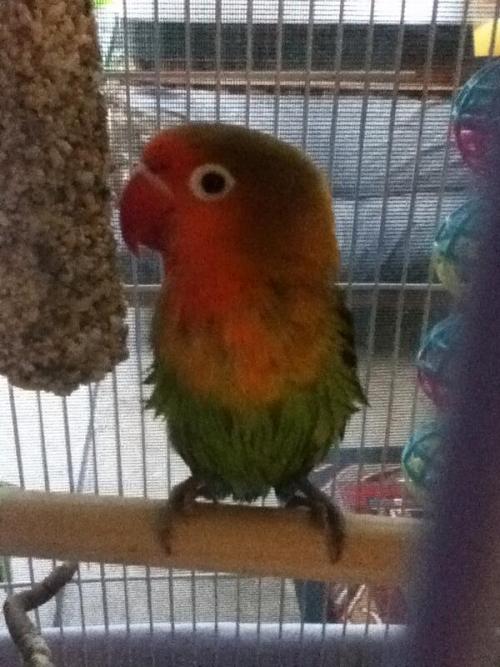@
Zekromite @
Buckyroba
Yeah, millet is always a favorite of small parrots. XD But remember that too much seed will give you a fatty bird when she's a full adult, so it's best to start introducing Carue to more fruits and veggies now than later since she is starting to explore different foods. A little at a time to get her used to it. If you don't get her used to a variety of fresh foods then you'll end up with a super picky bird like my Piper.
Ahh, she has to get used to hulling the seeds herself, but she'll figure it out eventually. She's still pretty young. c: And yeah parrots will lick everything. Since they don't have hands, they use their tongues as a way to feel textures and to figure out if something is edible or able to be chewed.
As for water, I totally understand where you're coming from. When I first got Piper, since I got him the very day he turned 6 months old, he was never used to drinking water out of a bowl or through a water dispenser. For a couple of months, I had to make sure to take him to where we have the drinking tap several times every few hours, and I would put a little droplet of water on the tip of my finger and he would sip it off of my finger, since he was still not transitioned away from baby feeding. However, after awhile he figured out how to drink out of his water dish and he has been fine since then.
Everyday, you should make sure to bring her attention to her water dispenser and to show her that she can drink from it. It might take some time but she will get it eventually, you just gotta be patient and careful about what she consumes during the training.
---
For fresh fruits, some basics that you could start getting her to try are
apples,
bananas,
grapes,
melons,
blueberries,
strawberries,
raspberries,
pears, and citrus fruits like
oranges,
tangerines, and some
lemon. Some more unusual ones that you can give her would be things like
kiwis,
lychee,
blackberries,
guava,
peaches,
nectarines,
plums,
currants,
fresh figs,
mangoes,
papayas,
pineapples, and
pomegranates.
Remember that only 10% of her daily diet should consist of fruits, since they have a good amount of natural sugars in them. And for citrus, you should minimize it to only every
4 or 5 days that she eats them.
Some veggies that are good are
broccoli,
carrots (sometimes birds prefer carrots if they have been grated so they are smaller),
carrot tops,
bok choy tops,
collard greens,
peas,
lettuce (lettuce is mostly water so it's better to feed them other leaf vegetables, there isn't a lot of nutritional value),
kale (a nice dark leaf is good for them, and kale is probably the best leafy green you could provide),
spinach (spinach is great because it has a good amount of iron, and a lot of birds are iron deficient, but spinach should be only given here and there because it's thought to lower calcium absorption),
green beans,
pumpkins and
pumpkin seeds,
sprouts,
yams/sweet potato (birds usually like them better when cooked),
zucchini,
cucumbers,
hot peppers,
fennel,
bell peppers,
soft corn,
celery, and
turnips.
She'll probably turn her beak up at anything she deems to be too weird to eat, but constant exposure will probably get her to try and get used to the taste and texture of the food you're offering her. But, just like any other person or animal, there will be some things she just straight up doesn't like, so you gotta figure out what she likes and doesn't like after a few tries. c:
And you probably know this already, but always be sure to wash your fruits and veggies thoroughly to make them safe for her to eat! And organic foods are always better for her.
Some things that you should avoid giving her, since they are either
toxic or just plain unhealthy, are
apple seeds,
alcohol,
chocolate, extra salt or sugar,
asparagus, any beverages that have
caffeine in them,
sports drinks,
milks/creams/dairy products,
parsley,
tomato,
onions,
olives,
cherry pits,
pretty much any fruit pits actually,
dried fruits that were meant for human consumption only, and of course if you have any
houseplants you need to be sure that they are bird-safe, otherwise keep her far from them.
One food that is always noted as extremely bad is
avocado. Avocado is very toxic to parrots and it will end up fatal if they consume it.
Also for
peanuts, it's best to keep their consumption low, especially for raw peanuts. Plus, they, and all other nuts, are a fatty food. So too much seeds plus too much nuts = fat bird. However, when balanced with fresh foods and pellets it becomes a good part of their diet.
http://www.parrot-and-conure-world.com/non-toxic-for-birds.html
This has a good list of woods/trees, plants, and foods that are both toxic and safe for your bird.
---
She just needs to get more used to her cage being the nest than the nest box. c: Consistent training is needed to change their diets and other habits.
And for pellet brands, I use and prefer
ZuPreem bird pellets, as they have a really good amount of vegetables in them and are overall nutritious. You should try and get your bird to start eating them as soon as you can, along with the fresh veggies, since she seems to be pretty attached to seeds and nuts. The longer you wait the more difficult it will be to get her to eat a better diet, since birds tend to be plucky and stubborn. ;p
Just remember that it takes a lot of time and patience to get your bird used to these things, she probably wont take to it right off the bat.










